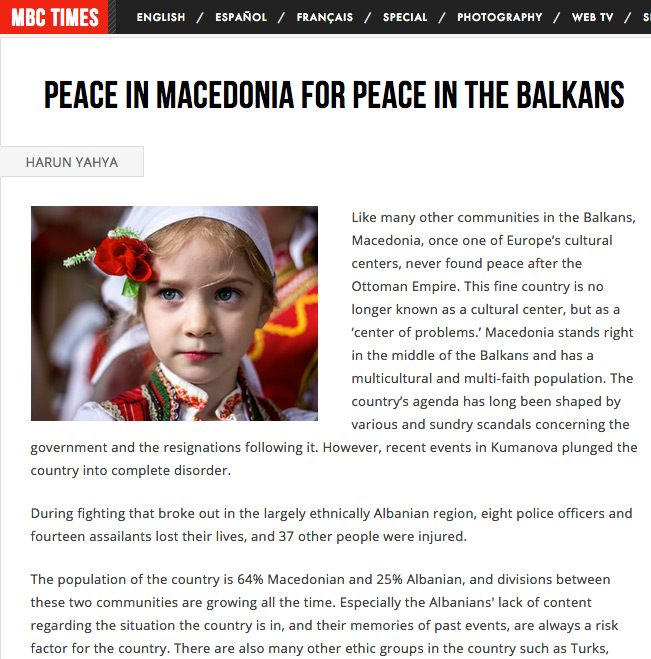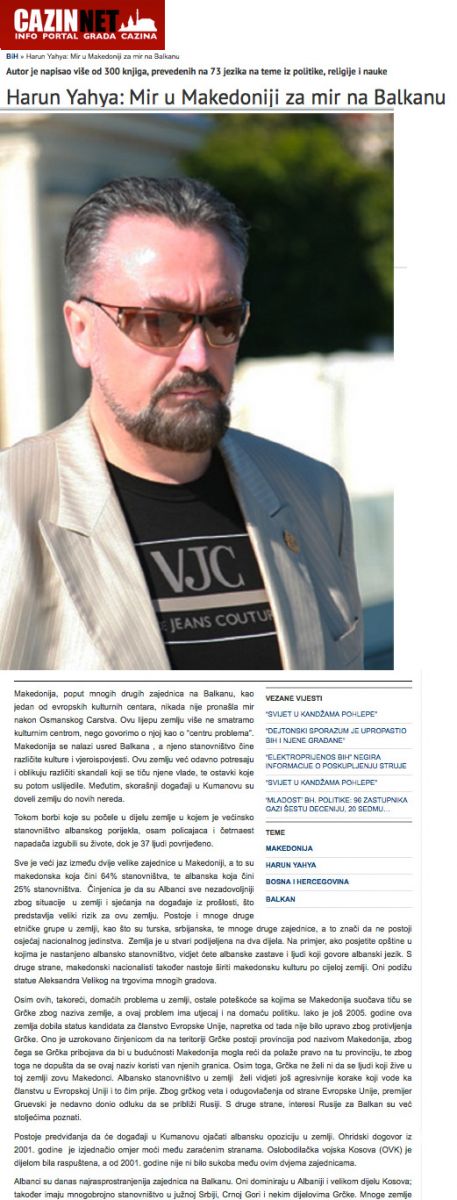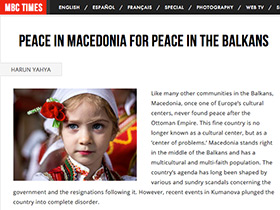

During fighting that broke out in the largely ethnically Albanian region, eight police officers and fourteen assailants lost their lives, and 37 other people were injured.
The population of the country is 64% Macedonian and 25% Albanian, and divisions between these two communities are growing all the time. Especially the Albanians' lack of content regarding the situation the country is in, and their memories of past events, are always a risk factor for the country. There are also many other ethic groups in the country such as Turks, Serbians and other communities, but there is no unity among these communities; that is to say there is no sense of common citizenship in the country. The country is essentially split into two poles. For example, when you go to Albanian dominated municipalities you see Albanian flags, and people speak Albanian. Macedonian nationalists, on the other hand, are attempting to spread Macedonian culture across the whole country. They are erecting statues of Alexander the Great in squares in numerous towns.
Along with these domestic problems in the country, the primary external difficulty is one with Greece, chiefly concerning the country’s name; this particular problem is also affecting domestic policy. Although the country attained candidate EU member status in 2005, it has made no further progress due to Greek opposition. Greece is uneasy because there is also a province called Macedonia within her territorial borders and Greece fears that Macedonia may lay claim to that province in the future and is thus unwilling for the name to be used outside Greece proper. In addition, Greece does not want the people living in the country to call themselves “Macedonians” either. The Albanian population in the country wants to see more aggressive steps for unification with the EU being taken and accession to come about as soon as possible. Due to Greek vetoes and foot-dragging on the part of the EU, Prime Minister Gruevski has recently adopted a policy of drawing closer to Russia. Russia's interests in the Balkans, on the other hand, have long been well-known, dating back centuries.
It's been predicted that the events in Kumanova will strengthen the Albanian opposition in the country. The Ohrid Framework Agreement signed in 2001 devolved the balance of powers among the sides. The Kosovo Liberation Army (KLA) was partly disbanded, and since 2001 there has been no conflict between the two communities.
The Albanians are today the most widely dispersed community in the Balkans. They dominate Albania and much of Kosovo; they also have majority populations in southern Serbia, Montenegro and some parts of Greece. Many countries are quite uneasy about the Albanians' dream of a ‘Great Albania’ spreading across the Balkans and Serbia certainly heads the list of these countries. Greece, currently wracked by unceasing economic crisis, is also deeply concerned because it has its own areas with significant Albanian populations.
In order to avoid the triggering of new conflicts, it is very important for the government to avoid polarization with the Albanian community in the wake of Kumanova. This is because any tensions that may arise between Albanians and Macedonians, and conflicts that result from them, will most likely not remain limited to Macedonia. Due to the distribution of population in other countries, such conflicts have the potential to affect the entire region. The government must therefore adopt a policy of conciliation aimed at establishing peace between the two communities. Peace in Macedonia is very important for the future and for the security of the Balkans.
Opposition protests aimed at bringing down the government and opposition- held meeting involving some 100,000 people are of course the opposition’s democratic right. However, it is of the greatest importance for these protests and meeting to remain peaceful and for the opposition not to resort to violence. For the sake of peace in the Balkans, Albanian, Macedonian and Turkish opposition leaders must work diligently to ensure that these protests do not turn into violent action and devolve into an explosive revolutionary situation. The Macedonians in the government must be on their guard against both domestic and external provocations, and they must always choose the rational path, the path of peace.
Comprehensive policies must be produced to strengthen the feeling of Macedonian citizenship, and the process of integration with the rest of the world must be stepped up. It is also very important for the future of the entire Balkan region that disputes between the government and the opposition be resolved through negotiations and good intentions, rather than through force of arms or oppressive impositions.
Adnan Oktar's piece on MBC Times & Cazin.net:
http://www.mbctimes.com/english/peace-in-macedonia-for-peace-in-the-balkans
http://www.cazin.net/vijesti/clanak/harun-yahya-mir-u-makedoniji-za-mir-na-balkanu


